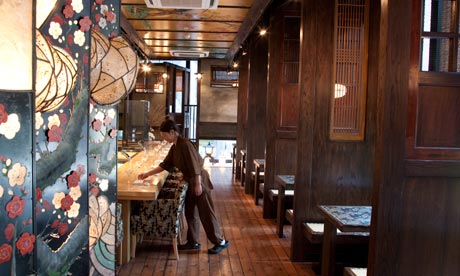
20 Bury Street, London EC3 (020 7621 9211). Meal for two, including wine and service, £100-£150
Given their taste for, among other things, whale, the notion of quality ethical Japanese food can be a little difficult to swallow. Anybody who has visited the extraordinary Tsukiji fish market in Tokyo and seen the magnificent and terribly endangered Bluefin tuna laid out on the floor awaiting sale will know just how deeply held is their love of foods we here regard as forbidden. The Bluefin shed looks like a luxury car park, with its serried rows of chromium-gilded Cadillacs of the sea. They might as well hang a bloody great sign across the entrance to Tsukiji bearing the legend: "It's not our fault they taste nice." Apparently the Japanese fleet is not raping the sea, because the fish were asking for it. Ethical sushi; environmentally sound oil drilling; a good-value, quality sandwich from Welcome Break motorway services – all are ideas which should encourage you to punish anybody making such claims with a poke in the eye with an (ethically farmed) bamboo chopstick.
Soseki, however, does a very good job of making the words "ethical" and "sushi" sit comfortably side by side. The location, under the bulging armpit of Norman Foster's Gherkin in the City, makes it feel very much like a place you might find in the Japanese capital, where restaurants are piled one atop another. Pull back the sliding door in an anonymous office block and ascend the steep stairs to a perch floating above the urban landscape. It is wood and tatami mats and booths with high, varnished walls. A sushi bar runs the length of the room and at the back are two cabins reached by step ladders – possibly the most discreet private dining space in London. It is a place apart.
Caroline Bennett, the restaurant's owner, has won a number of accolades for her work on sustainable seafood and was a consultant on Charles Clover's important film The End of the Line, about the impact of the global fishing industry. For all that, Soseki wears its principles lightly. This is a Japanese restaurant which happens to look beyond what happens on the plate but doesn't bash you over the head with homilies. Indeed, f you didn't know about its philosophy you might be hard pushed to spot it. During our meal, there were only two points where it made itself felt, once successfully, once less so. Witness a brace of "unagi", those sauce-glazed and grilled tassels of eel, across lozenges of rice. Here, rather than being fashioned from eel, whose numbers are depleted, they are made from dogfish, whose numbers aren't. Though it lacks the mouth-filling oiliness of eel, it still does a brilliant job. My companion, who had declared herself hardcore when it comes to Japanese food, didn't spot the difference until it was pointed out to her. A nori roll made with canned (un-endangered) tuna was far less successful, a claggy mouthful which did the ingredient few favours.
That was a rare low point. Although choices are listed, they steer you towards multi-course kaiseki menus. It is worth taking the hint. We loved cubes of bland tofu under a punchy sauce of sweet miso scattered with sesame seeds, and curls of beef dressed with the citrus burst of ponzu. A stew of long-braised pork belly with a smear of hot wasabi in an umami sauce was an old English dinner – braised pork and mustard – refracted through an Asian lens. There was a tranche of cod with a crisp skin in bright broth and a cooling bowl of slippery green tea noodles with wasabi and shredded seaweed. The sashimi and nigiri sushi – sweet scallop and sea bass, sea bream and salmon, both its flesh and bright orange roe – did exactly what was required of them. It is not the greatest sushi available in London; the rice is a little stodgy, the knife work occasionally a little ragged. But it is pretty damn good. Dessert, a green-tea ice cream with a chocolate torte and berries, is something you eat because it's there.
Staff are eager, helpful and particularly accommodating on the booze, quick with killer sake recommendations. They also offered to swap in a more expensive wine by the glass because they were out of the cheaper one I had chosen, but at the same price. The cost of all this? Oh you know. Lots. But then if we're going to eat the best the sea has to offer and do it sustainably it shouldn't be cheap. It is quite literally the price we have to pay for eating ethically.
Email Jay at jay.rayner@observer.co.uk or visit theguardian.com/profile/jayrayner for all his reviews in one place
• This article was amended on 13 June 2011. In the article above we misspelled roe. This has been corrected.

